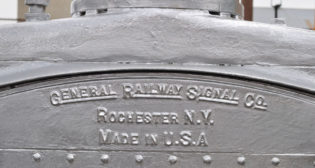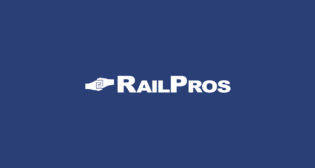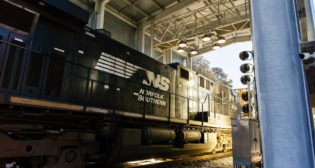
Oil and Gas Conglomerate Invests in Masabi—and Public Transportation
Written by William C. Vantuono, Editor-in-ChiefMasabi, a global developer of FPaaS (Fare Payments-as-a-Service) for public transport, on Feb. 6 announced that it has finalized an investment from Shell, among the world’s largest oil and gas companies. “This investment will help support the global expansion of Masabi’s Justride platform, which is bringing cutting-edge ticketing technology and enabling Mobility-as-a-Service (MaaS) for public transport operators and authorities of all sizes around the globe,” the company said. Masabi and Shell did not disclose the terms of the investment.
Masabi said Shell’s investment is an extension of its recent $20 million growth funding initiative led by Smedvig Capital, with MMC Ventures and other existing venture capital investors. “With more than 70 clients across 13 countries, Masabi’s world-first integration with transport leaders including Uber, Transit, Jorudan and Kisio Digital is making it easier for people to choose and use public transport services through mass consumer apps, helping place public transport at the center of the global MaaS movement,” the company noted. “Increased use of public transport is an important step in decarbonizing the mobility sector both in urbanized areas and more widely.”
Currently processing more than $1 billion in annual transport ticketing sales, Masabi said it “continues to add features and functionality to the Justride platform. Its latest capability removes the need for passengers to buy a ticket before traveling, allowing them to simply tap a contactless bank card, mobile phone or smartcard to ride. This adaptability and continuous innovation allows the company to bring new and better ways of running ticketing services to cities of all sizes. Instead of bespoke fare collection systems that are slow to deploy, expensive, often in place for decades and do not easily update with new features and functionality, cities can move to an FPaaS model using a platform that is quick to deploy, reduces costs and is constantly updating with new features available for everyone to use. This new way of delivering ticketing services helps cities keep up with the pace of technology change, while allowing more money to be put back into running transport services.”
“As mobile ticketing has evolved, so has the scope of our work,” said Masabi CEO Brian Zanghi. “We have expanded our focus beyond just enabling the purchase of tickets to offering passengers convenient solutions for discovering transit options and driving uptake of public systems to reduce congestion. Today, we are working alongside industry leaders in the mobility space to drive the broad deployment of mobile ticketing and fare payment systems around the world. We are delighted to welcome Shell as a strategic partner and look forward to working with them to improve the accessibility, discoverability and usability of public transport services globally.”
“While hybrid and zero-emission projects have proven that the potential for reducing costs and cutting emissions is substantial, we also see the need to take vehicles off the road by transitioning drivers to become riders,” said Shell Vice President of E-Mobility Roger Hunter. “But for this to happen, there needs to be a revolution in how people make and take journeys in and around cities. Public transport has to modernize and become easier and simpler to choose and use. Through our partnership with Masabi, we find ourselves at the forefront of an emerging technology that is already delivering a tangible and positive impact on how people move around towns and cities across the world.”
“This is a notable investment for Shell that could point to the oil and gas company’s push toward diversification,” Smart Cities Dive reporter Chris Teal commented. A Shell spokesperson told Teal that “concerns about the environment helped drive this decision, and is a key part of the company’s overall aims. We have a clear strategy that sets a competitive path forward to create a world-class investment case by delivering more and cleaner energy solutions. We view this move as part of that. We think a long-term goal for the world to achieve net zero emissions is challenging but feasible—requiring urgent action and long-term vision from policymakers to stimulate commercial and consumer opportunities. Shell will play its role where it makes commercial sense, and you’re getting a glimpse of that in this partnership. To thrive in the energy transition we have to deliver the products and services our customers need—not only today but in the future. Making good on that commitment means providing more choices and convenience from transport systems along with greater connectivity … Today, significant changes are taking place, at different paces in different countries. It’s critical that we recognize and keep up.”
“Fossil fuel companies’ roles in the climate crisis have been well-documented, and cities and states have increasingly looked to punish them with high-profile lawsuits and efforts to divest from fossil fuel interests,” Teal noted. “For their part, companies have started to at least pay lip service to alternative fuels and ways to get around. BP’s website, for example, says it is ‘advancing the options’ that are ‘cleaner and better.’ The investment also has similarities with automaker efforts to be more than car manufacturers, and instead be known as mobility companies. Ford ran with that trend in 2018 with its purchase of dockless scooter company Spin, while others have been moving into manufacturing electric vehicles (EVs) and are looking to get involved in other areas like ride-hailing as a way to promote better urban living. Partnering with a technology company that looks to make transit a more attractive option is another way to attempt to help cut carbon emissions, although time will tell if it allows Masabi to expand as quickly as it would like and drive increased transit ridership.”
Masabi describes itself as “bringing fare payments to public transit agencies of all sizes around the globe. Through our Fare Payments-as-a-Service platform, Justride, agencies can sign up to mobile ticketing services, enable Mobility-as-a-Service (MaaS), or deploy an account-based full fare collection solution using contactless bank cards, mobile devices and smartcards. With more than 70 clients across 13 countries, including cities such as New York, London, San Diego, Sydney, Tokyo, Denver, Las Vegas, Los Angeles, Orleans, The Hague and Bucharest, Justride is the world’s leading Fare Payments platform, serving the largest transit agency in the U.S. to local bus operators.” Masabi has offices in New York, Denver, London and Cluj, and investors include Mastercard, Keolis, and now Shell.



